Different Types of Sweet Potatoes
Types of sweet potatoes
There are a ton of different types of sweet potatoes, but it’s hard to find most of them in the store.
Here are 5 types of sweet potatoes more common on the current market:
- Hannah sweet potato
- Japanese sweet potato
- Jewel sweet potato
- Purple sweet potato
- Garnet sweet potato
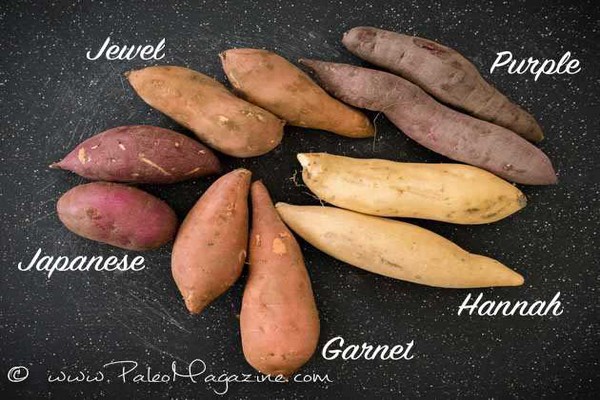
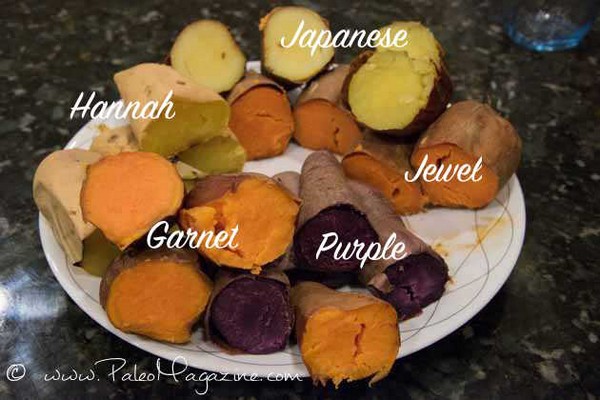
1) Hannah Sweet Potatoes
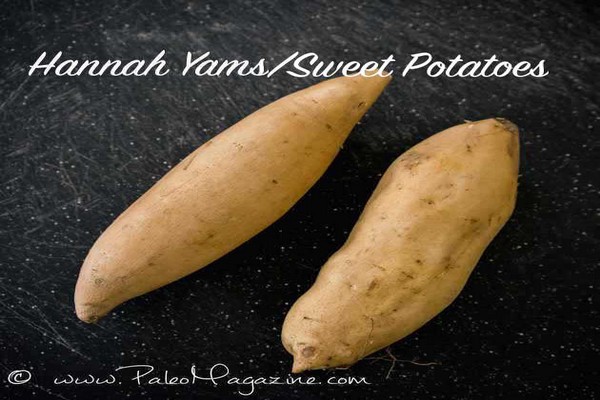
SKIN – Cream-colored and pretty smooth.
FLESH – Cream/whitish colored that becomes yellow when baked.
TASTE – Pretty sweet and fairly firm inside (Hannah sweet potatoes are considered a dry or firm sweet potato meaning that the flesh is pretty firm and dry when cooked).
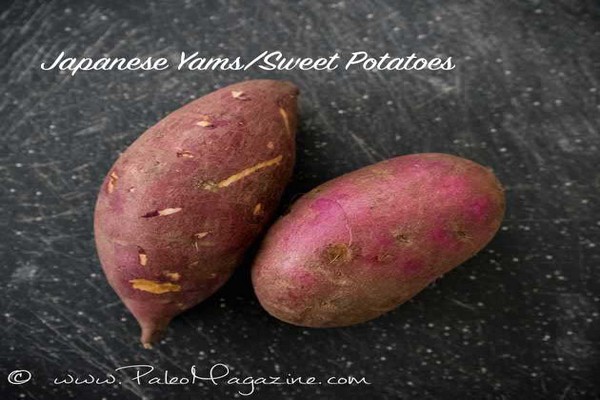
SKIN – Purple and fairly smooth. Generally more round (“fatter”) than the Stokes purple sweet potatoes, which are more elongated.
FLESH – Whitish flesh that turns golden when baked.
TASTE – Very sweet and fairly firm inside.
NUTRITION – Data from Calorie Count.
Serving Size: 1 medium (130g)
Calories: 113
Fat: 0
Cholesterol: 0
Potassium: 438mg
Total Carbohydrates: 27g
Protein: 2.3g
Vitamin A: 202%*
Vitamin C: 30%*
Calcium: 5%*
3) Jewel Sweet Potatoes
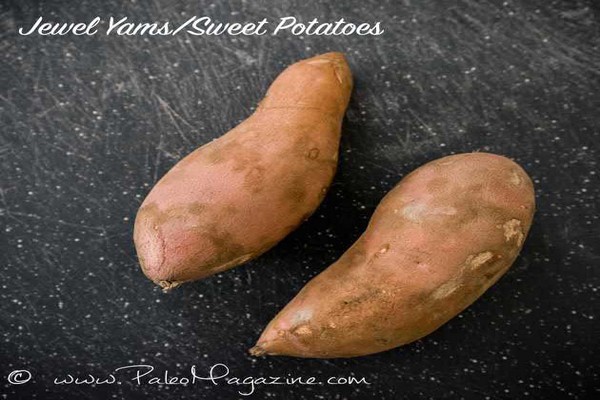
SKIN – Orange/copper. I find it really hard to tell garnet and jewel sweet potatoes apart because their coloring is fairly similar both inside and outside. To me, it seems that garnets are slightly more reddish in color on the outside.
FLESH – Deep orange.
TASTE – Mildly sweet and fairly firm inside.
NUTRITION Data from Earthbound Farm.
Serving Size: 3/4 cup (85g)
Calories: 70
Fat: 0
Cholesterol: 0
Sodium: 15mg
Total Carbohydrates: 23g
Dietary Fiber: 2g
Sugars: 2g
Protein: 1g
Vitamin A: 300%*
Vitamin C: 10%*
Calcium: 2%*
Iron: 2%*
4) Stokes Purple Sweet Potatoes
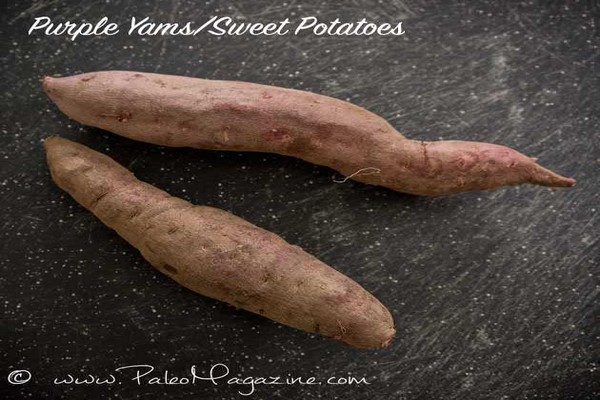
SKIN – Deep purple.
FLESH – Deep purple.
TASTE – Not very sweet, and pretty dry inside.
NUTRITION – Data from Stokes Foods.
Serving Size: 4 oz (113g)
Calories: 130
Fat: 0
Cholesterol: 0
Sodium: 0
Total Carbohydrates: 29g
Dietary Fiber: 4g
Sugars: 4g
Protein: 2g
Vitamin A: <2%*
Vitamin C: 20%*
Calcium: 4%*
Iron: 6%*
Antioxidants – these purple sweet potatoes are high in anthocyanin, a phytochemical.
5) Garnet Sweet Potatoes
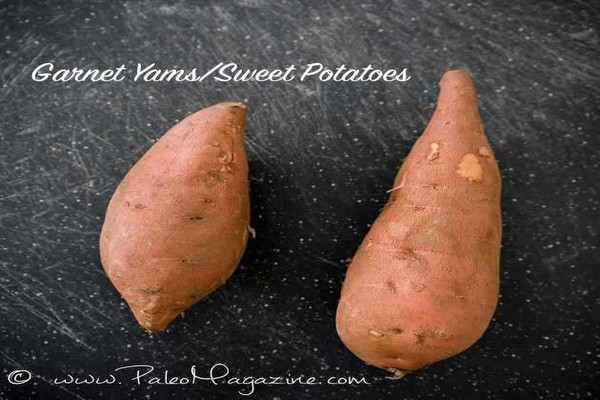
SKIN – Reddish/Dark Orange.
FLESH – Orange.
TASTE – Mildly sweet, and pretty moist inside.
NUTRITION – Data from Earthbound Farm.
Serving Size: 3/4 cup (85g)
Calories: 80
Fat: 0
Cholesterol: 0
Sodium: 15mg
Total Carbohydrates: 22g
Dietary Fiber: 2g
Sugars: 2g
Protein: 1g
Vitamin A: 300%*
Vitamin C: 8%*
Calcium: 4%*
Iron: 2%*
Sweet Potato Nutrition:
Sweet potatoes are a fantastic source of vitamins and minerals (especially vitamin A, although please note that the type of vitamin A in sweet potatoes is betacarotene, which is not converted well into vitamin A in humans – typically only 3% of beta-carotene you intake is converted into vitamin A).
Sweet potatoes are also a great source of “high-quality protein”, meaning that it contains all the essential amino acids your body needs even though the absolute amount of protein is fairly low.
They’re also a good source of antioxidants.
Side note – the only thing to watch out for is if you have digestive issues that may be exacerbated by sweet potatoes or if you have blood sugar issues.
How To Cook Sweet Potatoes
There are so many different ways to incorporate sweet potatoes into your diet.
The easiest way is to boil/steam/oven-bake/microwave the whole sweet potato with the skin on.
- For boiling or steaming, cook until you can stick a fork easily into the sweet potato (30-60min).
- For baking, poke a few holes into each sweet potato with a fork or knife, and bake on 350-375F (175-190C) until a fork goes in easily (45-90min).
- And for microwaving, poke a few holes into each sweet potato with a fork or knife, place it in a microwaveable dish, and microwave on high for 5-10 minutes.
Which One Is Your Favorited Type of Sweet Potato?
Let us know in the comments below which type of sweet potato you love. The Japanese sweet potato is my current favorite!
Source from http://paleomagazine.com/types-of-sweet-potatoes-with-images-and-why-you-should-eat-them
Discover more from Sweet Corn Specialist at Cameron Highlands, Malaysia
Subscribe to get the latest posts sent to your email.


